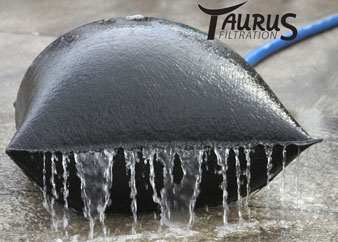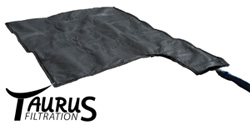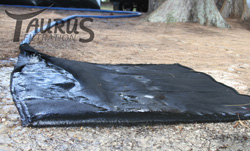Sediment Filter Bags for Sale By USA Manufacturer
Our dewatering bags, also known as sediment filter bags or silt bags, are an easy and economical option for any site looking to remove sediment or silt from their discharge. Each Taurus Dewatering Bag is constructed from a robust geotextile filter fabric to catch and contain sediment as it is pumped from your site. An industry favorite, Taurus Dewatering Bags are USA-made and available for sale in Standard, heavy-duty, and Contractor models, making these sediment filter bags versatile enough for construction sites, power plants, dredging areas, and more. See additional Dewatering Bags and Socks.

Filter Properties: Flow rates are based on fabric ratings during manufacturing. During a dewatering process, times may slow depending on the sediment content of your water and bag size. Please contact our sales team to discuss pumping rates for the duration of your project.
Capacity is estimated only and intended as a guide to users. The volume per sediment filter bag is dependent on soil composition, site conditions, and use. Information is provided in good faith. Actual field trials are the only true benchmark for how your bag will perform.
Dewatering Bags Help You Stay in Compliance
DOT Guidelines: Taurus contractor dewatering bags can help your site stay in compliance with local and federal stormwater regulations. Their components meet USDOT Erosion and Sediment Control requirements and exceed minimum guidelines outlined in the Florida DOT Erosion and Sediment Control Design and Review Manual.
Sizing and Location: Determining the right size of dewatering bag for your location is highly dependent on several on-site conditions. When choosing a bag for your location, some common factors we urge customers to take into consideration include the following:
- Pump Flow Rate
- Quantity and Type of Sediment
- Permittivity
- Volume of Materials Needing Containment
Read about a customer asking about a Dewatering Silt Filter that can be Hoisted with a Track Excavator.

Dewatering Bags Sizing and Placement
Dewatering bags may also be sized according to the location where they will be placed. In certain locations, areas may have size restrictions that will dictate what size bags they are able to handle.
Dewatering Bags Location Options:
- 20′ Drop Box
- Dump Truck
- Construction Site Areas
- Containment Vehicles
Steep-sloped surfaces are typically not recommended as the bag may roll.
Porous Surfaces: To improve the performance levels of your sediment filtration bags, placement on a permeable or porous surface (such as hay bales or aggregate) may help to facilitate a faster dewatering process. Take care to select a surface that will not damage the bag (use of a ground cloth can help prevent damage from occurring).

Discharge Hose and Stormwater Runoff
Each sediment filter bag is typically designed to handle a discharge hose that is either 2,” 3,” or 4″ in size. While bags will most commonly feature a hose inlet, placement of a hose may also be achieved by inserting the hose through a small incision in the fabric. Once the hose is in place, the fabric can then be clamped to the hose via wire, ties, clamps, ropes or similar seals.
Filtered Water Runoff: Water runoff from the dewatering bag should be guided to the nearest inlet and take care to avoid causing any erosion.
Other Dewatering Bags Considerations:
These dewatering sediment bags are rugged, but not indestructible. Care should always be taken to properly monitor performance to ensure that pump rates or concentrations of sediment are not excessive. Failure to do so may cause the filter bag to fail.
Avoid multiple pipe discharges into 1 bag. One bag per discharge is recommended unless specifically designed.
Filtering Materials: Using our dewatering filter bag in conjunction with a flocculent or polymer for finer clay and organic media will definitely improve flow rates, discharge clarity and the percent of solids retained.
Contact us today and ask one of our technical staff members to discuss options for soil media testing and recommend site-specific polymers!



